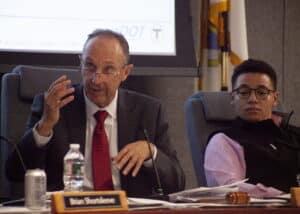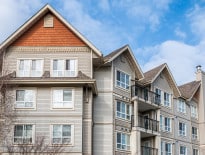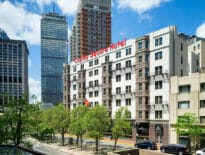
Fiscal and Management Control Board Chair Joseph Aiello (left) said the board "certainly is in favor" of electrifying the commuter rail system after it unanimously approved a resolution calling for the long-term change. Photo by Chris Lisinski | State House News Service.
The MBTA’s board on Monday voted to back substantial investment in the commuter rail system, outlining support for electrifying the system and running more frequent service through the most dense corridors.
Members of the Fiscal and Management Control Board voted unanimously in favor of five resolutions that set a regional urban rail network – rather than a commuter network focusing on trips into Boston in the morning and out of the city in the evening – as an aspirational goal and call for near-term pilots to electrify three lines.
The board also instructed the T to develop a new office to oversee commuter rail changes, ask the legislature to support procurement reforms Gov. Charlie Baker has proposed, and create a complementary bus transformation office.
The board’s resolutions do not immediately launch the “full transformation” that a commission had endorsed, but they are a step toward long-term improvements that community leaders and transportation advocates have called for to reduce greenhouse gas emissions, improve equity and take cars off congested roadways.
Because the FMCB is seeking a combination of investments, the potential cost was not clear Monday. Alternatives 5 and 6, which members wanted to draw from, were projected to cost $10.6 billion and $28.9 billion, respectively, in the Rail Vision study. Aiello’s resolution said the three pilot programs would require about $1.5 billion, but the chairman declined to answer questions from reporters after Monday’s meeting about the overall price tag.
The improvements will start on three lines. One resolution the board adopted instructs T officials to prepare immediately to launch electrified pilot programs on the Providence/Stoughton Line, the Fairmount Line and a section of the Newburyport/Rockport Line connecting Boston to Lynn, Revere, Chelsea and Everett, sometimes referred to as the “environmental justice line” because of the communities it runs through.
The resolution also calls for service on the Fairmount Line and the “environmental justice” section of the Newburyport Line to be as frequent – and at the same fare level – as rapid transit.
Although those pilots would be the first phase of a broader transformation, it is not clear when they might begin. MBTA General Manager Steve Poftak said Monday that it could take two to four years to acquire electric trains for the programs.
Baker told reporters Monday that he believes “significant portions” of the commuter rail should be electrified “over the course of the next 15 or 20 years,” but only if the grid can handle the capacity and if electricity would be cleaner than diesel.
“The grid, as it stands today, would be a close call,” Baker said. “If we manage to get our hydro and our offshore wind and some of the other initiatives we’re pursuing to improve the quality of our electricity and we have the electricity available to electrify the system, there are certainly parts of it that should be electrified, yeah.”
House lawmakers are preparing to debate new revenue options “sourced from transportation for transportation” this fall, such as increasing the state’s gas tax or the fees imposed on ride-hailing trips.
Several important business groups are supporting the House’s revenue efforts, and even the T’s board has in the past called for new revenues to fund the system: Some members said in April, as they approved a budget that included unpopular fare increases, that the legislature needs to identify additional funding sources for public transit.






